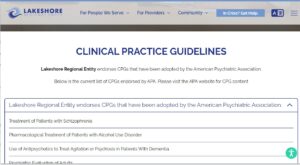Services for Adults with Mental Illness
There is strength in seeking help
Crisis Services
OnPoint crisis program offers crisis services to the community 24 hours/day, 7 days/week, 365 days/year. The OnPoint crisis unit is staffed by mental health professions including MAs, LMSWs, and LPCs. Staff within the crisis unit may provide or link a person to one or more of the following services.
-
- Assessment
- Crisis counseling
- Risk assessment
- Inpatient hospitalization
- Crisis Residential
Access
The Access services is a front door to services at OnPoint. Eligibility is based upon medical necessity. An OnPoint professional will perform a comprehensive assessment to determine your current needs. Based on your assessed needs our mental health professionals will recommend appropriate services. If you are not eligible for services at OnPoint, our staff will connect you to our customer service unit or community resources to assist in meeting your needs.
Adult Outpatient
Adult outpatient services provide a variety of individual and group therapies. The focus in adult outpatient is on recovery and thus improving one's interpersonal and social relationships. Treatment is individually designed to maximize psychological functioning, self-control, develop appropriate skills, normalize reality orientation, and emotion stabilization. Individual and group therapies are performed by mental health professionals (LMSW, MA, LPC). OnPoint has therapists trained in several modalities such as Motivational Interviewing (MI) and Eye Movement Desensitization and Reprocessing (EMDR).
-
- Individual therapy
- Dialectical Behavior Therapy (DBT)
- Integrated Dual Disorder Therapy (IDDT)
- Seeking Safety
- Testing Services
Psychiatric Services
Psychiatric services are for adults with persistent mental illness, adults and children with an intellectual disability and children with a severe emotional disturbance. These services include psychiatric evaluation, medication review, and health services.
Psychiatric Evaluation: A comprehensive evaluation, performed face-to-face by a psychiatrist or Nurse Practitioner. The doctor or NP will ask questions to assess the presenting problem; the history of the present illness; previous psychiatric, physical, and medication history; relevant personal and family history; personal strengths and assets; and a mental status examination. This examination concludes with a written summary.
Medication Review: A physician or Nurse Practitioner evaluates and monitors your current medications. They will assess the medications effects, and the need for continuing or changing medications.
Health Services. Health Services are typically provided by an RN and include an initial review of the consumer's health-related needs. Additional services provided by the RNs include:
-
- Injection Clinic – Nurses give injections of Haldol and Prolixin as are prescribed by agency physicians.
- Clozaril Clinic – Nurses run a Clozaril clinic for clients who have been prescribed Clozaril. These clients are seen on a weekly basis for monitoring of their response to Clozaril.
- Lab Tests – Along with the physicians, the Community Support Services nurses monitor the results of lab tests ordered for Community Support Services clients.
Monitoring. When clients are seen for medication reviews, a nurse checks their vitals, does AIMS test when required, and educates the clients, family members and AFC providers about expected results and possible side effects of the prescribed medications.
Family Services (including Children Services)
Children and Family Services are always provided with consideration of the child's and their family's needs. The focus in the Children and Family Service Unit is on recovery and improving one's family structure and relationships. Services are individually designed to strengthen families and children. Services are provided by mental health professionals (MA, LMSW, LPC). Services for families may be provided in the home as well as in the community. To learn more, visit our Children's Services.
Assertive Community Treatment (ACT)
ACT is a service-delivery model that provides comprehensive, locally based treatment to people with serious and persistent mental illnesses whose needs have not been met well by traditional approaches to service delivery. ACT is targeted to individuals who have the most serious symptoms of mental illness and experience the most severe difficulties with basic day-to-day functioning such as caring for basic physical needs, maintaining adequate and safe housing, and keeping themselves safe. Individual participating in ACT services receive services from a multidisciplinary team that includes mental health professionals, RN, and psychiatrist. ACT team members are trained in the areas of psychiatry, social work, nursing, substance abuse, and vocational rehabilitation. The ACT team provides these necessary services 24 hours a day, seven days a week, 365 days a year. Treatment and services may include:
-
- psychopharmacologic (medication) treatment
- individual supportive therapy
- mobile crisis intervention
- hospitalization
- substance abuse treatment, including group therapy (for clients with a dual diagnosis of substance abuse and mental illness)
- behaviorally oriented skill teaching (supportive and cognitive-behavioral therapy), including structuring time and handling activities of daily living
- supported employment
- support, education, and skill-teaching to family members
- collaboration with families and assistance to clients with children
- direct support to help clients obtain legal and advocacy services, financial support, supported housing, money-management services, and transportation.
OBRA PASARR Services
- OBRA
- OBRA is a service providing mental health consultation with nursing home staff to ensure that Individuals approved for nursing home admission through the PASARR process are receiving appropriate mental health treatment. The staff are Mental Health professionals (LMSW). These staff provide nursing home monitoring and individual psychotherapy. NH monitoring can include recommendations concerning how to appropriately address the mental health needs of nursing home residents. Such recommendations can include referral to individual therapy or psychiatric services, as well as ideas for socialization, communication, behavioral modification, staff training, and linking with community resources and enhanced socialization including community outings. The OBRA staff provide individual therapy to enhance mental health recovery and assist nursing homes with discharges to less restrictive placements once medical needs subside.
- Parents and children meet at the clinic to talk about worries, problem behaviors, learn new coping skills. Parents further develop their parenting skills and learn how to understand and support their children.
- Pre-Admission Screening/Annual Resident Review (PASARR)
- The PASARR program assesses a person's medical and mental health needs to determine the most appropriate placement setting and then to annually review those approved for nursing home placement to ensure that nursing home placement remains appropriate.
- PASARR is an assessment that screens consumers with diagnoses of mental illnesses and/or developmental disabilities whom are targeted for nursing home placement. The assessment consists of a nursing, psychosocial and psychiatric evaluation. When screening someone with a developmental disability, additional assessments including psychological testing, occupational and speech therapy evaluations are required.
- The preadmission screening is conducted in a variety of settings prior to nursing home placement and the annual assessment is completed yearly in the nursing home.
Informational Brochures
To learn more about our services, we invite you to download the below brochures (PDF).
• Assertive Community Treatment (ACT) Brochure
• Adult Services Brochure
• Case Management Brochure
• Housing Assistance Brochure
• Mobile Crisis Brochure
• Self-Determination Brochure
Build a Healthier Mind for a Stronger You
At OnPoint, we offer a free, flexible, and comprehensive digital program called myStrength. myStrength provides proven tools and dedicated support for stress, depression, sleep and more.
Are you ready to become the best version of you? MyStrength gives personalized support for many types of emotional and physical challenges.
- Reducing stress
- Improving sleep
- Managing depression
- Managing anxiety
- Mindfulness & meditation
- Balancing intense emotions
- Pregnancy & early parenting
- Managing chronic pain

You may refer to the Clinical Practice Guidelines shown above by clicking the following link:
Clinical Practice Guidelines - Lakeshore Regional Entity (lsre.org)
Intensive Crisis Stabilization Services for Adults & Children

